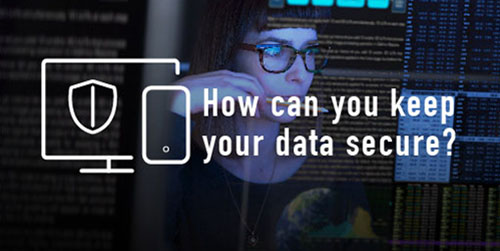Paper documents have never been secure. No matter how careful you are, they can still be picked up and read by anyone. The digital age offers a new chance to protect your valuable data - but what steps should you take to improve your security?
We’ve put together ten tips for improving your document security online.
1. Pick a Secure Password
Before we get to the technical stuff, you should make sure you have the basics down. Whether you are new to technology or an expert, passwords are at the centre of online security. Make sure everyone on your team has a strong password! The difference between a strong password and an average password may only be one letter, but it could save your company documents.
In the modern age, we’re moving away from passwords being a ‘word’. They should include numbers and letters, as well as other punctuation. One way to create a password is to take the first letter from every word in a line of a song! Then just add a number and a punctuation mark, and you’re all done. Otherwise, use a combination of digits.
It’s also important to have a different password for every account. This can be easy to forget as we all get lazy, but it’s worth it if you want to protect your data.
2. Multi-Factor Authentication
A password is single-factor authentication. This means it takes one step to log into your account. However, this means if your password is hacked, the hacker can access your data. If you have a strong password, this is a small risk - but it’s still a risk!
Multi-factor authentication removes this possibility. It adds another step for signing in. One example is a pin-code sent to your phone number which can be entered on the login screen. Alternatively, you could use an app on your phone to verify who you are.
Other forms of authentication are becoming more common. With the rise of biometric data in day-to-day life, technology can check who you are with unique data. Companies might use voice recognition software or finger-print analysis. This is an even higher level of security as the access is so unique to you.
3. Encryption
A lot of companies say their data is encrypted, but what does this actually mean? In short, it’s a way of scrambling data so you can only access it with the right key. To protect your data, you should make sure it’s encrypted to a high level. There are different levels of encryption: it’s not just a matter of encrypted or unencrypted! The highest level is AES 256-bit encryption. This is the standard that should be used for confidential board documents.
4. Back Up Your Data
Make sure you back up your data through a trusted source. This can either be through cloud-hosting software (such as AWS storage) or at a remote location. Ideally, any software you use should do daily automatic backups. This ensures that the integrity of your data is absolute. It can also help to make sure obsolete data is not kept around, which will make it easier to keep track of documents.
5. Up-to-date software
Software is changing every day. Even if your software was top-of-the-range five years ago, it might be outdated today. Security is getting better, but so are hackers. Make sure you pay attention to the changes in security standards. Any software you employ should be on top of regular updates.
6. Work with trusted companies
Whichever company you work with should have verification from external sources. The highest standard of this is CMMI Level 5 Accreditation. This is the level required by the US Government. It’s also worth checking to see if they have any customer testimonies as this will help you assess whether the company is reliable.
7. Wipe vulnerable hardware
Even in the digital age, security includes hardware as well as software. Devices can go missing: by accident or on purpose. It’s important to make sure you don’t leave important data lying around. You should be able to remotely delete data in the case it is lost or stolen. Automatic erasure is a helpful tool to ensure data is deleted. This can be used whenever a user has signed out or stayed offline for a specific number of days.
8. Control access and permissions
Access control is a key part of data security. A permission-based system means the administrator can control exactly who can see which documents. During a meeting, you might have data that only the Chairman and a relevant sub-committee need to see. Back in the days of printed documents, you would have to shield the paper like a poker player. Now, you can simply remove access.
This is also a bonus if you are inviting non-Board members to your meetings. For example, if the CFO is giving a presentation on the budget, they do not need to access your sensitive legal documents. Granular access controls remove the risk of documents falling into the wrong hands.
9. Incident management
Sometimes, things will go wrong. You should make sure that any incidents are dealt with swiftly and efficiently. Your software should be monitored 24/7 for data breaches and have a built-in detection mechanism for risks. You want people on your team that understand information security, and know how to deal with any incidents. It is not good enough to hope incidents do not happen. You must be prepared in case they do.
10. Audit trail
An audit trail is crucial for improving your document security. Make sure you know who has accessed every document and what actions have been taken. In the digital age, this is easier than ever. You do not have to manually go through every piece of paper as there is software to register actions for you. If there is any suspicious activity, you can act straight away.
How can a Board portal improve your document security?
A Board Portal like Convene is designed to the highest level of security. Unlike other apps, it is purpose-built for storing confidential documents. From drafting the meeting minutes to creating a secure audit trail, we can improve your security at every step of the process. We are CMMI Level 5 Certified and our software uses AES-256 bit encryption. If you have any other security questions please see our FAQs.
Our new product Convene in Teams, which is our Board Portal product fully integrated with Microsoft Teams, provides a full audit trail for your whole organisation and also uses Microsoft Active Directory to ensure the highest level of security.
We have numerous clients in different sectors who rely on us to provide this level of protection. Don’t leave your data security to chance! Contact us today to book a free trial.








